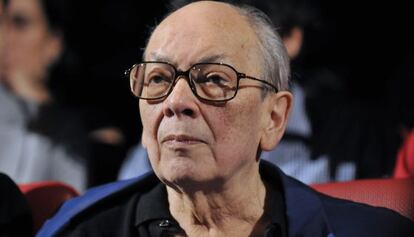Alfredo Guevara, key figure in Cuban film and Castro comrade
Founder of revolutionary cinema institute dies at age of 87

There are many things that jump out in the biography of Alfredo Guevara: his position as an intellectual; his role as founder of the Cuban Institute of Cinematographic Art and Industry (ICAIC), which he directed, in two different spells, for three decades; his early affiliation to the socialist cause; his friendship with Fidel and Raúl Castro; and his final years, which he dedicated to encouraging the opening of minds and spaces for debate within the revolution.
But no profile of Guevara, who died last Friday of a heart attack in Havana at the age of 87, would be complete without highlighting the central places that Cuba and the revolution had in his life.
Guevara was born in Havana on December 31, 1925, just a few months before Castro, whom he met while studying humanities at the University of Havana in 1945 when both were first cutting their political teeth. He joined the Communist Youth movement and even though he didn’t trust the future leader at first, he later struck up a friendship that turned into collusion in the revolutionary struggle.
In the final years of the Batista dictatorship, Guevara was exiled to Mexico and after Castro’s victory he formed part of a secret government that forged the most radical new laws, such as the agrarian reform law, in the first days of the revolution.
In 1959 the ICAIC was founded and Guevara became its first president. He had had some prior experience in film, having worked with Julio García Espinosa on the documentary El mégano, a stark condemnation of living conditions in Batista’s Cuba.
There and back again
Under his first ICAIC mandate, he oversaw such movies as Death of a Bureaucrat (1966), Memories of Underdevelopment (1968) and The Last Supper (1976) — all directed by Tomás Gutiérrez Alea — and Humberto Solás’s Lucía (1969). In Cuba’s grayest moments in the 1970s, the institute was always an island of culture, where there was room for criticism and creative freedom.
In 1969, from his position at the ICAIC, he backed the creation of the Grupo de Experimentación Sonora (Sound Experimentation Group), out of which the influential Nueva Trova musical movement developed, incorporating singer-songwriters such as Silvio Rodríguez and Pablo Milanés. In 1983 he went to Paris as the Cuban ambassador to Unesco, returning to preside the ICAIC at the end of the 1990s, coinciding with a crisis at the institution. Until his death, he was president of Havana’s International Festival of New Latin American Cinema, which he founded to promote the unity of filmmakers in the region.
Tu suscripción se está usando en otro dispositivo
¿Quieres añadir otro usuario a tu suscripción?
Si continúas leyendo en este dispositivo, no se podrá leer en el otro.
FlechaTu suscripción se está usando en otro dispositivo y solo puedes acceder a EL PAÍS desde un dispositivo a la vez.
Si quieres compartir tu cuenta, cambia tu suscripción a la modalidad Premium, así podrás añadir otro usuario. Cada uno accederá con su propia cuenta de email, lo que os permitirá personalizar vuestra experiencia en EL PAÍS.
¿Tienes una suscripción de empresa? Accede aquí para contratar más cuentas.
En el caso de no saber quién está usando tu cuenta, te recomendamos cambiar tu contraseña aquí.
Si decides continuar compartiendo tu cuenta, este mensaje se mostrará en tu dispositivo y en el de la otra persona que está usando tu cuenta de forma indefinida, afectando a tu experiencia de lectura. Puedes consultar aquí los términos y condiciones de la suscripción digital.








































